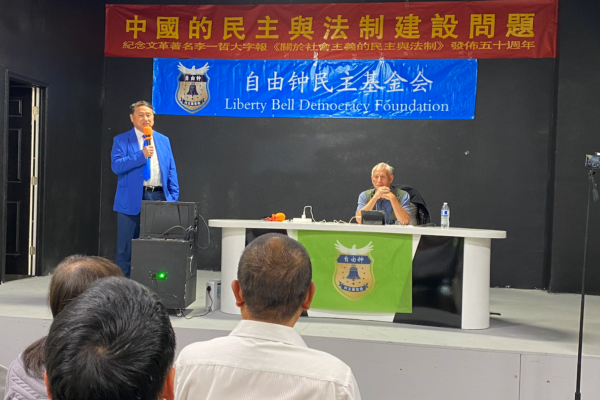After the Communist Party took power, Chinese people seeking redress and fighting for democratic rights have continued to emerge. In the later period of the Cultural Revolution, three young people using the pen name “Li Yizhe” in Guangzhou posted “big character posters”, criticizing the “Lin Biao system”, calling for democracy, and proposing suggestions for legal reform, causing a sensation. Wang Xizhe, who now resides in Los Angeles, is one of them.
Last Saturday, the Chinese Democratic Party United Headquarters and the Freedom Bell Democratic Fund invited Wang Xizhe to give a lecture to commemorate the half a century ago when he, along with Li Zhengtian, Chen Yiyang, and others, risked writing “Democracy and Legal System on Socialism” in the harsh political atmosphere, offering reflections on the Cultural Revolution.
“At that time, the democracy and rule of law in society were destroyed,” Wang Xizhe said in an interview, “A large number of innocent people were falsely accused of being counter-revolutionaries, subjected to home searches, struggles, insults, completely devoid of the rule of law.” “From top to bottom, cadres at all levels of the CCP were also overthrown; as long as you expressed different opinions, you would be labeled a counter-revolutionary.”
In the 1980s, Wang Xizhe was sentenced to 14 years in prison on multiple charges for preparing to form an opposition party. During his prime years from 33 to 45, he was incarcerated until his parole in 1993.
Looking back at the oppressive social atmosphere during the Cultural Revolution, Wang Xizhe said, “Everyone was living in fear, afraid of political persecution; the entire nation’s people were like this,” causing chaos in society and making it difficult for people to lead normal lives.
What he finds unbearable is that fifty years later, Chinese people still do not have freedom of speech, and the situation has “become even more serious”: speaking out about social issues on social media could lead to being summoned for tea or threatened into silence.
One of Wang Xizhe’s contemporaries and veteran democracy activist Zhu Yufu recalled being shocked when he first read the articles under the pen name “Li Yizhe”: “The articles addressed systemic and legal issues, hoping to confine the lawless Communist Party within the bounds of the rule of law, which was a significant event at that time.”
“These young intellectuals noticed the flaws in society, believed they found the reasons, and were driven by a spirit of exploration to dare to speak out, showing courage in the face of danger,” Zhu Yufu said, noting that while the articles had limitations at the time, they indeed bravely raised a question: “What is the cause of all the social chaos in China? Is it because the Communist Party is above the law or under the law?”
Zhu Yufu, who founded the Chinese Democratic Party in accordance with the law, was illegally sentenced to a total of 16 years in prison by the CCP. Even after his release, he was closely monitored, essentially still under virtual imprisonment. He pointed out that the ordinary people in China are in servitude, “without universal suffrage, without political rights; to maintain their privilege, the CCP has a sophisticated method of ‘harvesting leeks’ and treating everyone as ‘human resources’.”
The Chairman of the Chinese Democratic Party Committee, Wang Juntao, presided over the lecture that day. He relayed Hu Ping’s evaluation of the “Li Yizhe” incident, believing that the article was able to raise the issue of democracy and rule of law during the Cultural Revolution, demonstrating that the theory of the Cultural Revolution proposed by the then CCP leader Mao Zedong had failed.
“The article pointed out that we cannot just listen to the ‘great leader’, but must talk about democracy and the rule of law,” Wang Juntao said. “Whether or not the article was correct is another issue; it is important to raise the question. Sometimes raising the question is more important than solving the problem.”
Wang Juntao also admitted that he felt a great deal of pressure in hosting the meeting this time because there were significant differences in political views between some democracy activists and Wang Xizhe. “Regardless of our differences, I think the friendship formed over so many years in political life transcends political viewpoints. Actually, as long as we hold onto the essence of goodness, we can understand and interact with each other.” He quoted Hu Ping, saying, “We review the past and then firmly believe in the future.”
Facing an audience of varying ages, Wang Xizhe said, “I have gone from being a young man in his twenties to an old man in his seventies, and we are still striving.” He hopes that the torch of the democratic movement will be passed on: “I hope today’s youth can stand up, boldly shoulder the responsibility for the country and the nation.”

